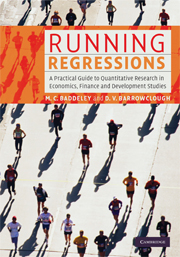 Running Regressions
Running Regressions Book contents
- Frontmatter
- Contents
- List of figures
- List of tables
- List of boxes
- Acknowledgements
- List of acronyms
- How to use this book
- Part I Simple regression and data analysis
- 1 An introduction to Ordinary Least Squares
- 2 Running simple regressions
- 3 Using logs and estimating elasticities
- 4 Hypothesis testing
- Part II Multiple regression and diagnostic testing
- Part III Time-series econometrics
- Part IV Advanced topics
- Index
- References
1 - An introduction to Ordinary Least Squares
Published online by Cambridge University Press: 05 June 2014
- Frontmatter
- Contents
- List of figures
- List of tables
- List of boxes
- Acknowledgements
- List of acronyms
- How to use this book
- Part I Simple regression and data analysis
- 1 An introduction to Ordinary Least Squares
- 2 Running simple regressions
- 3 Using logs and estimating elasticities
- 4 Hypothesis testing
- Part II Multiple regression and diagnostic testing
- Part III Time-series econometrics
- Part IV Advanced topics
- Index
- References
Summary
This chapter provides a brief and intuitive summary of the econometric theory that underlies OLS estimation, including:
The data generating process and sample regression functions
Types of data
Ordinary Least Squares (OLS) estimation
Measuring correlation and goodness of fit
The Gauss–Markov theorem
Properties of estimators
Hypothesis testing
Introduction
Running Regressions is about the quantitative analysis of observed behaviours and phenomena using economic theory, probability and statistics. By bringing these different elements together we can improve our understanding of people, firms and countries – in the past, the present and the future. For those readers who approach the subject with trepidation, it may be worth remembering this practical goal.
The skills that are required are not intrinsically difficult if a systematic approach is followed. Not least, our intention in Running Regressions is to illustrate commonly used techniques in an imaginative and interesting way. This chapter provides a brief introduction to concepts and techniques that are then worked through as practical examples in the following chapters.
Finally, whilst we focus on economics, finance and development studies in our selection of topics, the approach can be used in analysing a wide range of all real-world situations. The techniques can be, and are, used in all the social and natural sciences.
Models and data
The aim of econometric analysis is to understand the data generating processes (DGPs) that underlie economic systems and human behaviour. These DGPs are like the engines in a car and they propel socio-economic actions and events.
- Type
- Chapter
- Information
- Running RegressionsA Practical Guide to Quantitative Research in Economics, Finance and Development Studies, pp. 11 - 35Publisher: Cambridge University PressPrint publication year: 2009
References
- 1
- Cited by


